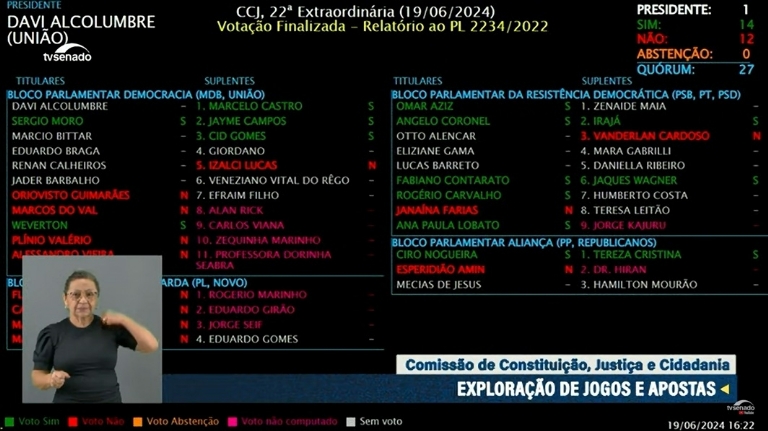

After countless postponements and maneuvers by the opposition to legal gambling, the Senate Constitution and Justice Committee finally voted on the opinion of Senator Irajá (PSD-TO), which legalizes gambling in Brazil.
When opening the discussions, the rapporteur highlighted the importance of the matter from a social and economic point of view, asking the senators to approve the matter given the benefits of the activity.
He cited the successful examples of Las Vegas, Cancún and Macau, as well as Latin American countries that have legalized the activity. “All democratic and civilized countries like Brazil, which regulated gaming and betting, said enough to illegal gambling and grew socially and economically.”
The parliamentarian recalled that of the G20 countries, only Saudi Arabia and Indonesia, with an Islamic majority, do not allow gambling, in addition to Brazil. And he also pointed out the members of the OECD, in which only Iceland does not have legal activity of this sector.
“No country that legalized gambling has gone back on regulating the activity, which shows that the benefits are visible. Among them, tax collection and the creation of formal jobs. Today in Brazil, the jogo do bicho alone provides more than 1 million informal jobs and illegal games operate under the shadow of the law without collecting taxes,” he said.
In his speech, the senator highlighted that in direct taxes on the activity alone, Brazil will be able to raise around R$22 billion (US$ 4.05bn) per year.
“Whoever does not want legal gambling, with limits, criteria, accreditation and supervision, is favoring illegal gambling. What is the benefit of clandestine gambling? None,” he concluded his demonstration.
Obviously, opponents of legal gambling made their speeches without concrete facts and with lies to try to convince those who were undecided to vote against Senator Irajá's report. But they were not convinced by arguments that were empty of content and filled with untruths.
In the end, the result once again demonstrated the progress that the Constitution and Justice Commission made on the matter, with 14 votes in favor and 12 against. Now, the project goes to the Senate Plenary.

Bill 2,234/2022, approved in the Chamber of Deputies as Bill 442.91, was presented in that House in 1991. In the Senate, it has been in progress since 2022. The text allows the installation of casinos in tourist centers or in integrated leisure complexes, such as high-end hotels. standard, restaurants, bars and places for meetings and cultural events.
According to the proposal, the installation of casinos in tourist centers or integrated leisure complexes will be authorized, that is, high-end hotels with at least 100 rooms, in addition to restaurants, bars and places for meetings and cultural events.
There will be a limit of one casino in each state and the Federal District, with the exception of São Paulo, which may have up to three casinos, and Minas Gerais, Rio de Janeiro, Amazonas and Pará, which may have up to two, each, in ratio of the size of the population or territory.
Casinos may also be installed on maritime vessels (with a limit of ten, throughout the country) and on river ships with at least 50 rooms, within the following limits: one casino on each river with a length between 1,500 and 2,500 kilometers; two in each river with a length between 2,500 and 3,500 kilometers and three in each river with a length above 3,500 kilometers. River vessels with casinos cannot be anchored in the same location for more than 30 days in a row.
The proposal also establishes rules for the game of bingo in card and electronic formats, and allows in each state the accreditation of one legal entity for every 700 thousand inhabitants to operate the game.
In this case, the authorizations will be valid for 25 years, renewable for the same period. Horse racing may be operated by turf entities (linked to horse racing) accredited by the Ministry of Agriculture, which may also operate, at the same time, bingo and video bingo games.
Source: GMB